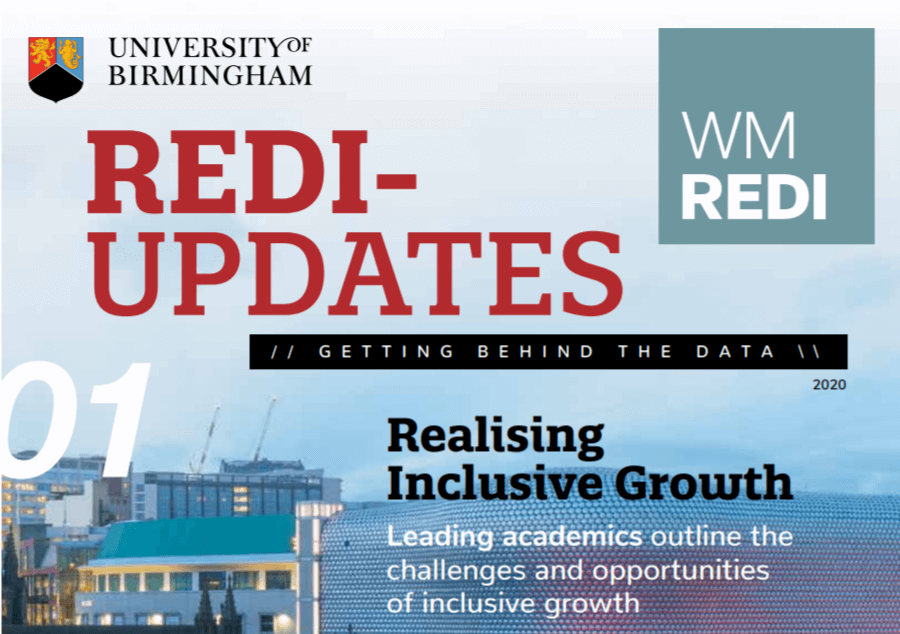Foreword – by Simon Collinson and Ben Brittain
When we began writing this, our first edition of REDI-Updates, the Covid-19 pandemic was a small and distant threat. A local crisis limited to a single city-region in China. The world has changed dramatically since then. As we re-focus our research efforts and our analytics towards projects which will help with the immediate crisis, we still believe that the topics covered in this edition remain highly relevant. They provide insights into how we might approach the post-COVID-19 ‘bounce back’, but also help with the challenges that come with a systemic shock, triggered by a healthcare crisis, but with damaging impacts on our economic and social wellbeing.
Inclusivity, balanced growth and resilience as well as the power of R&D and innovation to improve the ways in which organisations adapt to this new world are all discussed. Moreover, West Midlands REDI is a collaborative effort, hosted in a leading civic university, working with regional partners for the good of our local communities.
Inclusive Growth should not just be a policy aspiration
Inclusive Growth should not just be a policy aspiration. It can be – if fully realised and implemented appropriately – a way of ensuring growth spreads to each section of society, every community, and every region. It is a framework that encompasses transport, digital connectivity, devolution, housing and many others. If fully perused it is likely to translate indiscriminate economic growth into a fairer and more equitable society.
Whilst inclusive growth can be a tricky concept to define, it has multiple benefits for policy-makers, politicians and academics. It is precisely these benefits that we at WM REDI are working to realise, whilst tackling and understanding the challenges.
There is an urgency to realising the impact of the inherent trade-offs in the context of local and regional economic development strategy. In economic terms, the UK looks like two different countries, with a prosperous London and South-East whilst the rest of the country struggles to match productivity rates and prosperity. Most of the UK is below average in economic performance. In GVA terms, parts of the wider West Midlands display productivity levels similar to the poorer parts of former East Germany.
This means UK city-regions are not the motors of the UK economy they should be. In other prosperous countries, large cities benefit from agglomeration effects, but outside London, our cities are a drag on the economy rather than successful drivers of economic growth. Excluding London, only Bristol is more productive than the UK average.
This imbalance is unsustainable. For the UK economy to grow, our city-regions need to close the gap with London. But, growth alone is insufficient to ensure greater equality. London is the motor of the UK but is a very unequal economy. Inclusive growth ensures growth filters into something tangible for local communities.
As analysts and researchers, we are seeking to understand barriers to and drivers of economic growth. Often the picture is murky. As an example, the Gini coefficient may be a powerful way of understanding inequality, but alone it is insufficient. Finland and Moldova have a similar Gini coefficient, but they are fundamentally different economies.
REDI-Updates is a bi-annual publication which will get behind the data and translate it into understandable terms. WM REDI staff and guest contributors will discuss various topics, with this first publication focusing on how inclusive growth can be a tool to tackle regional imbalances across the UK.
Professor of Regional Economic Development, Anne Green, will seek to explain the concept of inclusive growth and give a working definition. Dr Charlotte Hoole will explore the importance of devolved administrations in making inclusive growth strategies succeed. Dr Deniz Sevinc will explore the depth of economic inequality in the region, whilst Dr Tasos Kitsos will argue for the need to link economic resilience with inclusive growth, providing analysis of the way different regions reacted to the 2008 financial crisis.
This edition’s REDI-Updates interview is with the Mayor of the West Midlands, Andy Street. In the interview, he details his efforts to enshrine inclusive growth in the West Midlands Combined Authority. In our “REDI to Debate?” section Rebeca Riley, director at WM REDI, discusses the recent decision in the Chancellor’s budget to revise Her Majesty’s Treasury (HMT) Green Book methodology.
View and download the magazine.
This blog was written by Ben Brittain, Research Fellow, City-REDI / WM REDI, University of Birmingham.
To sign up for our blog mailing list, please click here.
Disclaimer:
The views expressed in this analysis post are those of the authors and not necessarily those of City-REDI / WM REDI or the University of Birmingham

